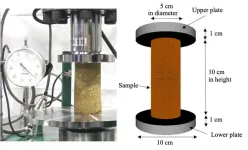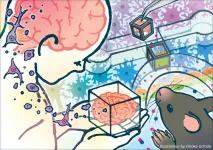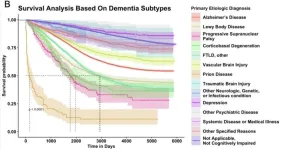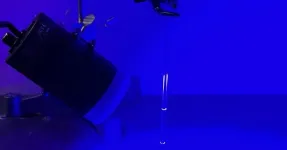(Press-News.org) Nano- and microplastics are seemingly everywhere — water, soil and the air. While many creative strategies have been attempted to get rid of these plastic bits, one unexpectedly effective solution for cleaning up drinking water, specifically, might be as simple as brewing a cup of tea or coffee. As reported in ACS’ Environmental Science & Technology Letters, boiling and filtering calcium-containing tap water could help remove nearly 90% of the nano- and microplastics present.
Contamination of water supplies with nano- and microplastics (NMPs), which can be as small as one thousandth of a millimeter in diameter or as large as 5 millimeters, has become increasingly common. The effects of these particles on human health are still under investigation, though current studies suggest that ingesting them could affect the gut microbiome. Some advanced drinking water filtration systems capture NMPs, but simple, inexpensive methods are needed to substantially help reduce human plastic consumption. So, Zhanjun Li, Eddy Zeng and colleagues wanted to see whether boiling could be an effective method to help remove NMPs from both hard and soft tap water.
The researchers collected samples of hard tap water from Guangzhou, China, and spiked them with different amounts of NMPs. Samples were boiled for five minutes and allowed to cool. Then, the team measured the free-floating plastic content. Boiling hard water, which is rich in minerals, will naturally form a chalky substance known as limescale, or calcium carbonate (CaCO3). Results from these experiments indicated that as the water temperature increased, CaCO3 formed incrustants, or crystalline structures, which encapsulated the plastic particles. Zeng says that over time, these incrustants would build up like typical limescale, at which point they could be scrubbed away to remove the NMPs. He suggests any remaining incrustants floating in the water could be removed by pouring it through a simple filter such as a coffee filter.
In the tests, the encapsulation effect was more pronounced in harder water — in a sample containing 300 milligrams of CaCO3 per liter of water, up to 90% of free-floating MNPs were removed after boiling. However, even in soft water samples (less than 60 milligrams CaCO3 per liter), boiling still removed around 25% of NMPs. The researchers say that this work could provide a simple, yet effective, method to reduce NMP consumption.
The authors acknowledge funding from the National Natural Science Foundation of China.
The paper’s abstract will be available on Feb. 28 at 8 a.m. Eastern Time here: http://pubs.acs.org/doi/abs/10.1021/acs.estlett.4c00081
For more of the latest research news, register for our upcoming meeting, ACS Spring 2024. Journalists and public information officers are encouraged to apply for complimentary press registration by completing this form.
###
The American Chemical Society (ACS) is a nonprofit organization chartered by the U.S. Congress. ACS’ mission is to advance the broader chemistry enterprise and its practitioners for the benefit of Earth and all its people. The Society is a global leader in promoting excellence in science education and providing access to chemistry-related information and research through its multiple research solutions, peer-reviewed journals, scientific conferences, eBooks and weekly news periodical Chemical & Engineering News. ACS journals are among the most cited, most trusted and most read within the scientific literature; however, ACS itself does not conduct chemical research. As a leader in scientific information solutions, its CAS division partners with global innovators to accelerate breakthroughs by curating, connecting and analyzing the world’s scientific knowledge. ACS’ main offices are in Washington, D.C., and Columbus, Ohio.
To automatically receive news releases from the American Chemical Society, contact newsroom@acs.org.
Note: ACS does not conduct research, but publishes and publicizes peer-reviewed scientific studies.
Follow us: X, formerly Twitter | Facebook | LinkedIn | Instagram
END
Bethesda, MD (Feb. 28, 2024) — Today, the American Gastroenterological Association (AGA) published a white paper on the future of inflammatory bowel disease (IBD) care in the United States. AGA highlights the current barriers to care and calls for collaboration among our healthcare community, insurers, pharmaceutical companies and legislators to improve and optimize care for the more than three million Americans living with IBD.
IBD is a complex disease that requires a vigilant and coordinated multidisciplinary approach. ...
A solid understanding of soil mechanics and behavior is one of the fundamental pillars of geotechnical engineering. The stability and resilience of many modern geotechnical structures, including building foundations, dams, bridges, and embankments, rely on appropriate modelling based on accurate measurements of soil properties.
Over the past few decades, unprecedented growth in computing power has turned numerical simulations of soil behavior into an attractive tool in geotechnical engineering. By representing soil as a set of interacting particles, numerical simulations can help researchers understand complex soil behavior under various conditions. Moreover, numerical ...
Washington D.C., Feb. 28, 2024- The Global Alzheimer’s Platform Foundation®, (GAP) is releasing the first results from the Bio-Hermes-001 Study. This study in over 1000 community-based participants from throughout the US compared the results of blood and digital biomarkers with brain amyloid PET scans or cerebrospinal fluid assays. The study revealed a strong correlation between several blood tests, particularly p-tau 217, with the presence of amyloid plaques in the brain, a diagnostic hallmark of Alzheimer’s disease (AD). This relationship was demonstrated across the entire study ...
Young people could be spared from going blind by a new genetic risk tool that could also help diagnose multiple sclerosis (MS) earlier, to start effective treatments.
Optic neuritis is a condition that affects people of all ages, but especially young adults, usually manifesting in blurred vision and sometimes pain when moving the eyes. Up to half of people affected in the UK eventually go on to develop MS – often many years later. Emerging evidence indicates that starting the very effective MS treatments earlier may improve long term health.
Optic neuritis occurs because of swelling in or around the optic nerve. For those with MS-related optic neuritis, the swelling subsides ...
Research Highlights:
An analysis of survey data for 430,000 adults in the U.S. found that using cannabis has a significant association with an increased risk of heart attack and stroke, independent of tobacco use, with higher odds among the adults with more frequent use (more days of use per month). The most common method of cannabis use was smoking, followed by eating or vaporizing it.
The increase in the combined risk of coronary heart disease, heart attack and stroke was similar to the risk among the subset of adults who had never used e-cigarettes but did use cannabis.
Embargoed until 4 a.m. CT/5 a.m. ET Wednesday, February ...
A research team at the RIKEN Center for Biosystems Dynamics Research (BDR) in Japan has succeeded in establishing a model of the blood-brain barrier using modularized tissue derived from human cells. The “Tissue-in-a-CUBE” is a small cubic structure that could provide a boost in the drug discovery field and be used as an alternative to animal models in pre-clinical studies. The study was published in Communications Biology on February 28.
The blood-brain barrier is a strict gatekeeper around the brain that prevents foreign substances in blood from entering the brain. Although protective, the barrier poses challenges when treatments ...
KEY TAKEAWAYS
Rheumatoid arthritis is associated with increased risk of cardiovascular disease, but it can be challenging to predict which individuals are at highest risk.
Mass General Brigham experts in rheumatology and cardiovascular disease worked together to identify six biomarkers found in blood samples that can predict future risk of arterial inflammation among patients with rheumatoid arthritis.
The team is now working to test these biomarkers in a larger and more long-term cohort of patients with rheumatoid ...
New York, NY [February 28, 2024]—Researchers at the Icahn School of Medicine at Mount Sinai and others have harnessed the power of machine learning to identify key predictors of mortality in dementia patients.
The study, published in the February 28 online issue of Communications Medicine [10.1038/s43856-024-00437-7], addresses critical challenges in dementia care by pinpointing patients at high risk of near-term death and uncovers the factors that drive this risk. Unlike previous studies that focused on diagnosing dementia, this research delves into predicting patient prognosis, shedding light on mortality ...
Molecules that are induced by light to rotate bulky groups around central bonds could be developed into photo-activated bioactive systems, molecular switches, and more.
Researchers at Hokkaido University, led by Assistant Professor Akira Katsuyama and Professor Satoshi Ichikawa at the Faculty of Pharmaceutical Sciences, have extended the toolkit of synthetic chemistry by making a new category of molecules that can be induced to undergo an internal rotation on interaction with light. Similar processes are believed to be important in some natural biological systems. Synthetic versions might ...
LA JOLLA (February 28, 2024)—The brain is typically depicted as a complex web of neurons sending and receiving messages. But neurons only make up half of the human brain. The other half—roughly 85 billion cells—are non-neuronal cells called glia. The most common type of glial cells are astrocytes, which are important for supporting neuronal health and activity. Despite this, most existing laboratory models of the human brain fail to include astrocytes at sufficient levels or at all, which limits the models’ utility for studying ...








